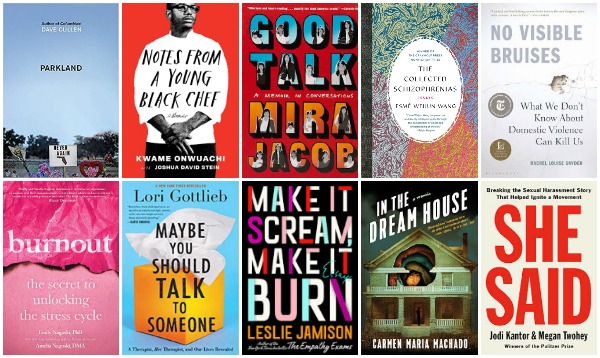
The first week of February isn’t too late for putting up a favorites of 2019 book list, right? Maybe don’t answer that one!
In any case, I couldn’t really start getting into my 2020 reading without following up my favorite fiction of 2019 with my favorite nonfiction. I read a ton of great true stories this year, so it was really hard trying to narrow it down to just 10 (which I really didn’t, there’s technically 11 on this list). I’m really excited to share all of these with you!
Parkland: Birth of a Movement by Dave Cullen
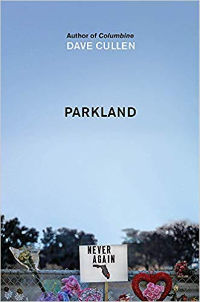 Dave Cullen is a meticulous, empathetic journalist, so I was eager to read his account of the 2018 shooting at Marjorie Stoneman Douglas High School in Parkland, Florida. What I loved about this book is that it doesn’t actually spend much time on the shooting itself and instead focuses on the work of the student activists who have emerged in the wake of the tragedy. His reporting and storytelling is impeccable, and presents a fascinating companion to Cullen’s other major book, Columbine. If you pick this one up, but sure to read through the endnotes – there’s a lot of detail there about how a good reporter works that I loved reading too.
Dave Cullen is a meticulous, empathetic journalist, so I was eager to read his account of the 2018 shooting at Marjorie Stoneman Douglas High School in Parkland, Florida. What I loved about this book is that it doesn’t actually spend much time on the shooting itself and instead focuses on the work of the student activists who have emerged in the wake of the tragedy. His reporting and storytelling is impeccable, and presents a fascinating companion to Cullen’s other major book, Columbine. If you pick this one up, but sure to read through the endnotes – there’s a lot of detail there about how a good reporter works that I loved reading too.
Notes from a Young Black Chef by Kwame Onwuachi and Joshua David Stein
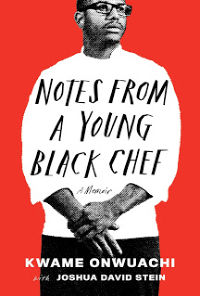 Food memoirs for the win! In this book, Kwame Onwuachi writes about how he went from being a kid in the Bronx to a celebrated chef in Washington D.C. His path took him all over, from New York to Nigeria to the Gulf of Mexico and beyond. I loved how honest he was about his choices (both good and bad), and appreciated hearing about his perspective and experiences as a black man in a largely white industry. I’ve recommended this one many times.
Food memoirs for the win! In this book, Kwame Onwuachi writes about how he went from being a kid in the Bronx to a celebrated chef in Washington D.C. His path took him all over, from New York to Nigeria to the Gulf of Mexico and beyond. I loved how honest he was about his choices (both good and bad), and appreciated hearing about his perspective and experiences as a black man in a largely white industry. I’ve recommended this one many times.
Good Talk by Mira Jacob
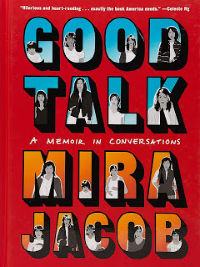 In this memoir, Mira Jacob grapples with how to answer the increasingly complicated questions about race and identity her six-year-old son started to ask in the wake of the 2016 election. Through recounting those conversations, she is able to explore “American identity, interracial families, and the realities that divide us.” It’s a heavy, but also really funny, and increasingly relevant as political divides become even more stark. I’m not sure I read a more heartbreaking or relevant book last year, which I say in the best way possible. Go read this one!
In this memoir, Mira Jacob grapples with how to answer the increasingly complicated questions about race and identity her six-year-old son started to ask in the wake of the 2016 election. Through recounting those conversations, she is able to explore “American identity, interracial families, and the realities that divide us.” It’s a heavy, but also really funny, and increasingly relevant as political divides become even more stark. I’m not sure I read a more heartbreaking or relevant book last year, which I say in the best way possible. Go read this one!
The Collected Schizophrenias by Esmé Weijun Wang
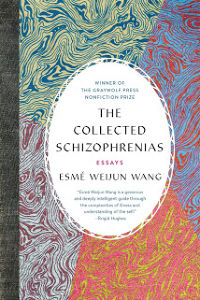 I almost always love the nonfiction that comes from Graywolf Press, and this book was no exception. This book is a collection of autobiographical essays about what it’s like to struggle with both mental illness and chronic illness. Esmé Weijun Wang begins with her initial diagnosis with a “schizoaffective disorder,” then goes on to look at arguments about labeling and diagnosis procedures, how schizophrenia manifests, and other misconceptions surrounding her diagnosis. It’s fascinating and beautifully written.
I almost always love the nonfiction that comes from Graywolf Press, and this book was no exception. This book is a collection of autobiographical essays about what it’s like to struggle with both mental illness and chronic illness. Esmé Weijun Wang begins with her initial diagnosis with a “schizoaffective disorder,” then goes on to look at arguments about labeling and diagnosis procedures, how schizophrenia manifests, and other misconceptions surrounding her diagnosis. It’s fascinating and beautifully written.
No Visible Bruises by Rachel Louise Snyder
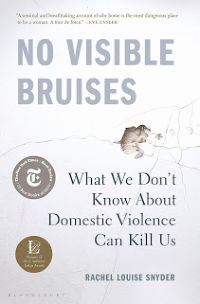 This book. Whew. Each day around the world, 137 women are killed by familial violence. And 54 percent of mass shootings in America today involve domestic violence. These statistics are at the core of the argument that journalist Rachel Louise Snyder makes in this book – domestic violence isn’t a private problem, it’s an urgent matter of public health. Snyder explores big questions about domestic violence with really precise, articulate, and confident reporting. It’s remarkable and so very important.
This book. Whew. Each day around the world, 137 women are killed by familial violence. And 54 percent of mass shootings in America today involve domestic violence. These statistics are at the core of the argument that journalist Rachel Louise Snyder makes in this book – domestic violence isn’t a private problem, it’s an urgent matter of public health. Snyder explores big questions about domestic violence with really precise, articulate, and confident reporting. It’s remarkable and so very important.
Burnout by Emily Nagoski and Amelia Nagoski
 If I had to pick the book that had the biggest impact on me personally this year, it’d be this one. This spring and summer, I realized that I was experiencing many of the symptoms of burnout and needed to do something about it. This book changed my outlook, specifically looking at what stress is like for women and offering concrete steps to address it in both the short and long term. I had so many lightbulbs while reading it, which helped me start taking some specific steps to address by burnout symptoms before they got the better of me.
If I had to pick the book that had the biggest impact on me personally this year, it’d be this one. This spring and summer, I realized that I was experiencing many of the symptoms of burnout and needed to do something about it. This book changed my outlook, specifically looking at what stress is like for women and offering concrete steps to address it in both the short and long term. I had so many lightbulbs while reading it, which helped me start taking some specific steps to address by burnout symptoms before they got the better of me.
Maybe You Should Talk to Someone by Lori Gottlieb
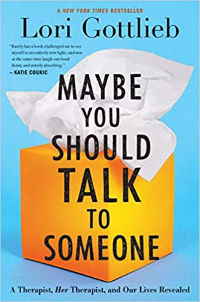 After a traumatic break-up, therapist Lori Gottlieb realized she needed some help in processing her thoughts and emotions. This book is all about therapy – what it’s like to go to therapy, what it’s like to be a therapist, and what it takes to really get the most out of therapy that you can. Gottlieb is open with her experiences, and writes about her own patients with an incredible sense of empathy. I was very moved by this book, and have recommended it to a lot of different people.
After a traumatic break-up, therapist Lori Gottlieb realized she needed some help in processing her thoughts and emotions. This book is all about therapy – what it’s like to go to therapy, what it’s like to be a therapist, and what it takes to really get the most out of therapy that you can. Gottlieb is open with her experiences, and writes about her own patients with an incredible sense of empathy. I was very moved by this book, and have recommended it to a lot of different people.
Make it Scream, Make it Burn by Leslie Jamison
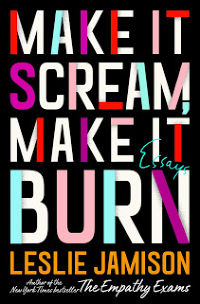 This collection of essays from one of my favorite authors covers a huge range of subjects, from children with past-life memories to a lonely whale named 52 Blue, to the author’s feelings about becoming a stepmother and a mother. I appreciate how specifically Leslie Jamison interrogates her thoughts and feelings, and how the themes of connection and privilege and perspective play into her work. She’s a really interesting thinker.
This collection of essays from one of my favorite authors covers a huge range of subjects, from children with past-life memories to a lonely whale named 52 Blue, to the author’s feelings about becoming a stepmother and a mother. I appreciate how specifically Leslie Jamison interrogates her thoughts and feelings, and how the themes of connection and privilege and perspective play into her work. She’s a really interesting thinker.
In the Dream House by Carmen Maria Machado
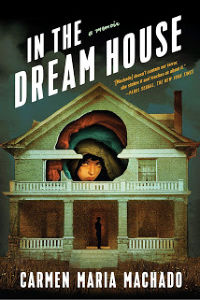 For many years, Carmen Maria Machado was part of an abusive queer relationship. In the book, she plays with format and narrative tropes to tell the story of that relationship and try to better understand queer domestic abuse more generally. I loved the way she used different storytelling techniques to see the relationship in different ways, and how each piece built on everything we’d already learned. It was utterly fascinating to read, and a book I’ve already recommended many times.
For many years, Carmen Maria Machado was part of an abusive queer relationship. In the book, she plays with format and narrative tropes to tell the story of that relationship and try to better understand queer domestic abuse more generally. I loved the way she used different storytelling techniques to see the relationship in different ways, and how each piece built on everything we’d already learned. It was utterly fascinating to read, and a book I’ve already recommended many times.
She Said by Jodi Kantor and Megan Twohey
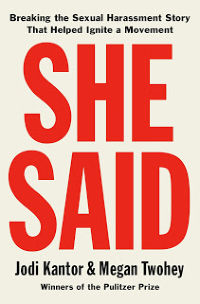 I surprised myself by reading two books about Harvey Weinstein and the #MeToo movement last year. In She Said, Jodi Kantor and Megan Twohey write about what it was like to break the story in the New York Times and explore how the subsequent reckoning affected the women who were willing to come forward. Another one I really loved was Catch and Kill by Ronan Farrow, a more personal story about his experiences reporting on this story and the shadowy ways that rich and powerful men can silence victims and those who try to expose them. I listened to this on audio and thought it was great. They’re very different books, but so closely connected in my brain it was hard to pick one over the other.
I surprised myself by reading two books about Harvey Weinstein and the #MeToo movement last year. In She Said, Jodi Kantor and Megan Twohey write about what it was like to break the story in the New York Times and explore how the subsequent reckoning affected the women who were willing to come forward. Another one I really loved was Catch and Kill by Ronan Farrow, a more personal story about his experiences reporting on this story and the shadowy ways that rich and powerful men can silence victims and those who try to expose them. I listened to this on audio and thought it was great. They’re very different books, but so closely connected in my brain it was hard to pick one over the other.

Comments on this entry are closed.
Never too late Thanks for sharing your favourites.
Thanks for sharing your favourites.
It was a good year of reading!
You’ve always been a go to for nonfiction recommendations for me so I’m jotting down the titles I haven’t read yet.
I hope you find one you enjoy!
I see some very good books here in your list. I’ve either missed or forgotten about the book Parkland. Until now, I didn’t realize that Dave Cullen wrote it. I loved his writing and meticulous approach in Columbine so that itself makes me want to read any of his books. I will be looking it up.
Parkland is such an interesting comparison to Columbine — it has a lot of the same research and care, but you can tell he’s coming at the topic with so much more experience and feeling. It’s great.
Never too late to enjoy a good “favorites” list
I am so excited to see Good Talk on your list. I just checked that out from the library this weekend.
I loved that one, I hope you do too!
Yay, what an excellent list! I loved the Dream House book, and Good Talk made me extremely emotional when I read it after Christmas. And She Said is on my list for 2020!
I also really enjoyed Maybe You Should Talk to Someone and Make It Scream, Make It Burn. Jamison is such an interesting thinker! I’d read anything she writes.
I didn’t love Notes From a Black Chef, which I thought suffered from the fact that he’s so young. I just wanted more.
I’d love to get to everything else on your list. You tackled a lot of tough, important topics, so I’ll probably space out getting to them as I’m up for some more challenging reads